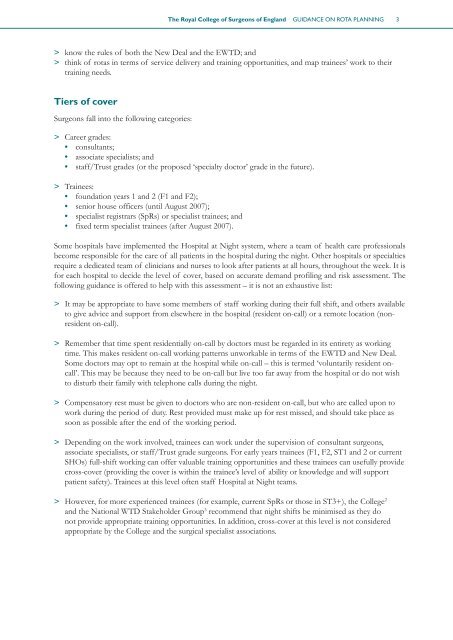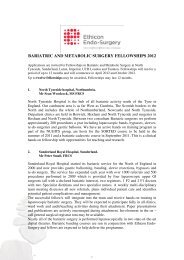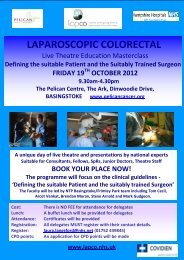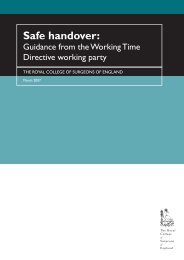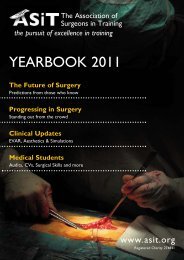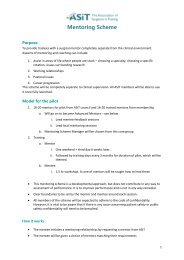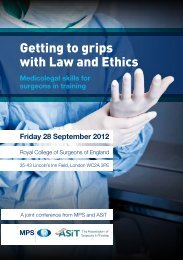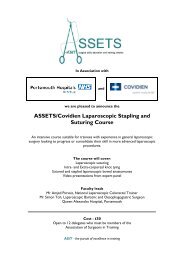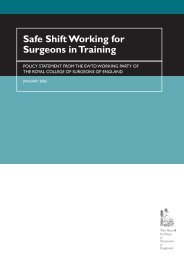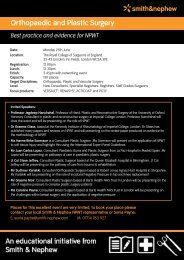rota planning.pdf - The Royal College of Surgeons of England
rota planning.pdf - The Royal College of Surgeons of England
rota planning.pdf - The Royal College of Surgeons of England
- No tags were found...
You also want an ePaper? Increase the reach of your titles
YUMPU automatically turns print PDFs into web optimized ePapers that Google loves.
<strong>The</strong> <strong>Royal</strong> <strong>College</strong> <strong>of</strong> <strong>Surgeons</strong> <strong>of</strong> <strong>England</strong> GUIDANCE ON ROTA PLANNING >>know the rules <strong>of</strong> both the New Deal and the EWTD; andthink <strong>of</strong> <strong>rota</strong>s in terms <strong>of</strong> service delivery and training opportunities, and map trainees’ work to theirtraining needs.Tiers <strong>of</strong> cover<strong>Surgeons</strong> fall into the following categories:>>Career grades:• consultants;• associate specialists; and• staff/Trust grades (or the proposed ‘specialty doctor’ grade in the future).Trainees:• foundation years 1 and 2 (F1 and F2);• senior house <strong>of</strong>ficers (until August 2007);• specialist registrars (SpRs) or specialist trainees; and• fixed term specialist trainees (after August 2007).Some hospitals have implemented the Hospital at Night system, where a team <strong>of</strong> health care pr<strong>of</strong>essionalsbecome responsible for the care <strong>of</strong> all patients in the hospital during the night. Other hospitals or specialtiesrequire a dedicated team <strong>of</strong> clinicians and nurses to look after patients at all hours, throughout the week. It isfor each hospital to decide the level <strong>of</strong> cover, based on accurate demand pr<strong>of</strong>iling and risk assessment. <strong>The</strong>following guidance is <strong>of</strong>fered to help with this assessment – it is not an exhaustive list:>>>>It may be appropriate to have some members <strong>of</strong> staff working during their full shift, and others availableto give advice and support from elsewhere in the hospital (resident on-call) or a remote location (nonresidenton-call).Remember that time spent residentially on-call by doctors must be regarded in its entirety as workingtime. This makes resident on-call working patterns unworkable in terms <strong>of</strong> the EWTD and New Deal.Some doctors may opt to remain at the hospital while on-call – this is termed ‘voluntarily resident oncall’.This may be because they need to be on-call but live too far away from the hospital or do not wishto disturb their family with telephone calls during the night.Compensatory rest must be given to doctors who are non-resident on-call, but who are called upon towork during the period <strong>of</strong> duty. Rest provided must make up for rest missed, and should take place assoon as possible after the end <strong>of</strong> the working period.Depending on the work involved, trainees can work under the supervision <strong>of</strong> consultant surgeons,associate specialists, or staff/Trust grade surgeons. For early years trainees (F1, F2, ST1 and 2 or currentSHOs) full-shift working can <strong>of</strong>fer valuable training opportunities and these trainees can usefully providecross-cover (providing the cover is within the trainee’s level <strong>of</strong> ability or knowledge and will supportpatient safety). Trainees at this level <strong>of</strong>ten staff Hospital at Night teams.>However, for more experienced trainees (for example, current SpRs or those in ST3+), the <strong>College</strong> 2and the National WTD Stakeholder Group 3 recommend that night shifts be minimised as they donot provide appropriate training opportunities. In addition, cross-cover at this level is not consideredappropriate by the <strong>College</strong> and the surgical specialist associations.


